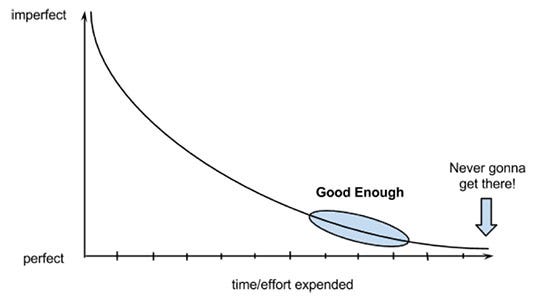The goal is progress not perfection
The title of this post is very easy to preach but very hard to practice. Perfection is the one trap that leaves people paralysed in a point of time. I think if you really enjoy the work you do, it is easier to fall into this trap.
Perfectionism is a state of mind, where you fail to see the progress made and you never become satisfied with your accomplishments. It mostly has to do with one’s internal satisfaction and not validation from external sources.
How do you know when you are trapped in perfectionism?
You keep extending the deadlines you set for yourself (or your team)
A lack of clear specifications or expectations
Very little tangible progress made, despite huge amounts of effort put in
Re-working multiple times the same parts of the project, based on your own assessments (not based on external feedback)
A lack of fulfilment from the current state of the project. Even when other’s appreciate you for the work done, you feel the urge to point out the flaws or what could have been better.
Perfection vs Perfectionism
The subtle difference between what is perfect and the perfectionism state of mind is hard to articulate. This article by Seth Godin explains it nicely.
The idea of perfect is important - a plane should not crash and should work exactly as expected. The plane meets a set of standards and specifications - and given that it operates under these constraints it works perfectly.
Perfectionism is seeking to meet some imaginary standards set by one for mostly themselves. It stems from one’s attitude as well as a lack of clearly set specifications and constraints.
Good enough
Good enough should be the goal. Even when clear standards and specifications are present, people tend to make that one last improvement before shipping or sharing their work with the world.
Anything beyond good enough is stalling. The goal before shipping should be good enough and not perfect.
The graph of effort vs quality is exponential in nature. The last 10% is the hardest to attain and takes the most amount of time. There are tons of images out there that show this, but here is one:
Perfectionism is not to be confused with attention to detail. Attention to detail is more of a skill where you are able to prioritise the things that others may perceive as less important. These are the kind of things that end up setting your work apart from your peers. Attention to detail needs to be factored at the time of creating specifications.
How to avoid the trap of perfectionism?
Set a hard deadline - this is easier said than done. Someone to hold you accountable might be useful to enforce this.
Write down the specifications or the outcome you are looking to achieve. Be as quantitative with this as possible. If it is not specified, you will not do it.
Try to track progress - this is again easier said than done. But a simple way to track progress could be to check if you are hitting milestones and asking others for feedback. Keep a progress journal.
Detach yourself completely for a couple of days - this usually helps to clear your mind and look at things from a fresh perspective
If you have met all the specifications or reached the deadline, then ship. Remember, anything beyond good enough is stalling.


